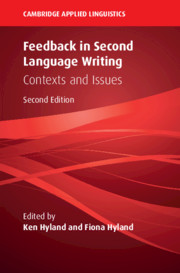Book contents
- Feedback in Second Language Writing
- The Cambridge Applied Linguistics Series
- Feedback in Second Language Writing
- Copyright page
- Contents
- Contributor Bios
- Acknowledgments
- Author's Preface
- Series Editors’ Preface
- 1 Contexts and Issues in Feedback on L2 Writing
- Section 1: Situating Feedback: Sociocultural Dimensions
- 2 Sociocultural Theory
- 3 Culture and Peer Feedback
- 4 Appropriation, Ownership, and Agency
- Section 2: Shaping Feedback: Delivery and Focus Dimensions
- Section 3: Negotiating Feedback: Interpersonal and Interactional Dimensions
- Section 4: Engaging with Feedback: Student Participation Dimensions
- Index
- References
4 - Appropriation, Ownership, and Agency
Negotiating Teacher Feedback in Academic Settings
from Section 1: - Situating Feedback: Sociocultural Dimensions
Published online by Cambridge University Press: 19 July 2019
- Feedback in Second Language Writing
- The Cambridge Applied Linguistics Series
- Feedback in Second Language Writing
- Copyright page
- Contents
- Contributor Bios
- Acknowledgments
- Author's Preface
- Series Editors’ Preface
- 1 Contexts and Issues in Feedback on L2 Writing
- Section 1: Situating Feedback: Sociocultural Dimensions
- 2 Sociocultural Theory
- 3 Culture and Peer Feedback
- 4 Appropriation, Ownership, and Agency
- Section 2: Shaping Feedback: Delivery and Focus Dimensions
- Section 3: Negotiating Feedback: Interpersonal and Interactional Dimensions
- Section 4: Engaging with Feedback: Student Participation Dimensions
- Index
- References
- Type
- Chapter
- Information
- Feedback in Second Language WritingContexts and Issues, pp. 64 - 82Publisher: Cambridge University PressPrint publication year: 2019
References
- 3
- Cited by

